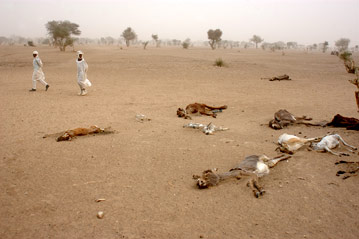Darfur refugees "facing disaster", warns Lubbers
Darfur refugees "facing disaster", warns Lubbers

GENEVA, June 3 (UNHCR) - UN High Commissioner for Refugees Ruud Lubbers warned today that people fleeing conflict in Sudan's war-ravaged Darfur region are "facing a disaster" unless peace is restored to the area where more than 1 million people have been displaced in recent months.
According to UNHCR estimates, some 158,000 refugees from Darfur have fled into eastern Chad. The agency has relocated more than 81,000 of them to seven new refugee camps further inland in Chad, away from the volatile border.
The UN refugee agency appealed for $20.7 million in February to fund its emergency assistance operation in Chad, but has so far only received $16 million. The agency is currently revising its budget and plans to appeal for more funds in light of the continuing arrival of refugees, the need for more camps and the potential for further influxes.
Lubbers, speaking in Geneva to senior government officials attending the High-Level Donor Alert Meeting and Consultations on Darfur, declared that funding for the relief effort is insufficient for the enormous needs.
"We are tapping into our own reserves, we are emptying our pockets," he said. "We cannot say that this is the humanitarian crisis of the day, and not fund the crisis."
He added, "Although we have made huge progress in the face of these serious obstacles, the international support and funding have not been forthcoming to keep our programmes running, improve the work we are doing and speed up the relocation operation."
He warned that there was a grave threat of incursions into Chad as well as the infiltration and presence of armed elements in refugee camps, possibly leading to forced recruitment, diversion of humanitarian assistance and harassment of the refugee population.
"Armed incursions by Janjaweed militia continue to constitute a tremendously serious threat to the lives of refugees," Lubbers declared.
He said that despite the generosity of its people, the already impoverished eastern Chad was being severely affected by the influx and needs much more international assistance.
"It is not sustainable in Chad to receive more and more people coming in. It's really too poor," Lubbers said. "We are facing a disaster."
The High Commissioner noted that torrential rains expected in the coming weeks will hamper UNHCR's ability to reach, relocate and assist refugees scattered along the Chad's long border with Sudan.
Between 200 and 300 new refugees are reported weekly in eastern Chad.
In addition to its country office in the capital, N'Djamena, the refugee agency has so far opened five offices in eastern Chad and is establishing a sixth at Bahai in the north. UNHCR and other aid agencies are currently distributing sorghum, oil and beans provided by the UN World Food Programme.
Addressing the 15 members of the UN Security Council two weeks ago in New York, Lubbers said, "The humanitarian situation is appalling on both sides of the border," and stressed that humanitarian agencies must be given access to the Darfur region to deliver aid and stabilise the situation.








